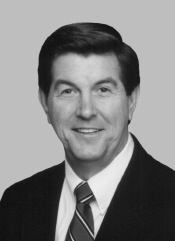Alabama governor; former US Representative from Alabama
A Representative from Alabama; born in Ashland, Clay County, Ala., October 3, 1944; graduated, Clay County High School, Mo., 1962; B.A., University of Alabama, Tuscaloosa, 1965; member, Ashland City Council, 1972-1976; business owner; rancher; real estate agent; elected as a Republican to the One Hundred Fifth and two succeeding Congresses (January 3, 1997-January 3, 2003); was not a candidate for reelection to the One Hundred Eighth Congress in 2002; Governor of Alabama, 2003 to present. After graduating from the University of Alabama with a degree in business administration, he returned to his hometown, married his high school sweetheart, and started a small business with his brother selling eggs door-to-door. The venture grew to become one of the largest integrated poultry operations in the Southeast. In 1996, Riley was elected to represent Alabama’s third congressional district. Riley worked to pass the first balanced budget in a generation, the first tax cuts in 20 years, and a stronger national defense from his seat on the House Armed Services Committee. He also fulfilled a promise to serve only three terms. In November 2002, Riley was elected Governor of Alabama. Riley has improved education, put Alabama’s economy on the right track and fostered honesty in the Governor’s Office. Riley assembled a Cabinet of leaders pledged to reform state government. Riley made his administration open and accountable. He banned pass-through pork, saving taxpayers $40 million. He implemented a budget process called SMART Governing that allows taxpayers to see how their money is being spent by every agency of state government. Riley changed Alabama’s economic development model. Alabama has achieved record low unemployment rates, experienced the creation of more than 100,000 new jobs, and attained a budget surplus. A strong and growing economy allowed Riley to increase education by more than $2 billion. Riley made investments in the Alabama Reading Initiative and the Alabama Math, Science and Technology Initiative and invested record funding into its classrooms. The state has the highest amount ever saved in its rainy day fund and proration prevention account. Riley was sworn into office for a second term in January 2007. Riley is pursuing an agenda called “Plan 2010.” Riley is proposing more funding for schools, including a bond issue to help school systems with construction projects and repairs. He is proposing pro-growth tax incentives that will help middle class families, make health care more affordable and create new jobs.
